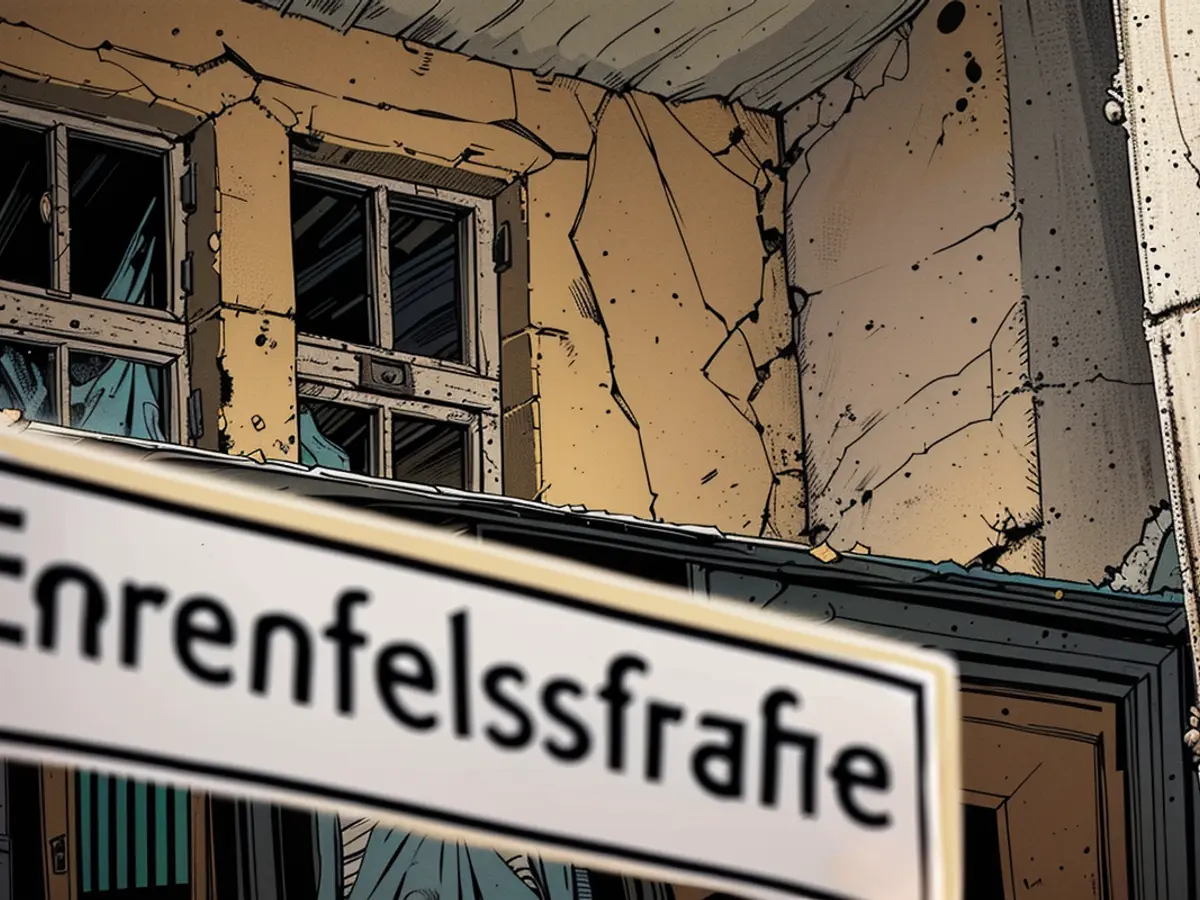Moscow remains tight-lipped concerning its holdings in Berlin.
Russia continues to claim territories in Ukraine while estates belonging to the Kremlin in Germany remain vacant. These vacant properties, often referred to as "ghost houses," have been abandoned in eastern Berlin for years. A Ukrainian-born MP from the CDU party proposes holding an auction, but the Senate appears uninterested.
The district of Karlshorst, known for its beautiful housing and greenery, includes several such "ghost houses." These houses, owned by Putin, create nuisances not only for the local residents but also due to the high demand for housing in Berlin. Instead of renovating and inhabiting these houses, they have been left to decay for over three decades. Berlin CDU politician Lilia Usik wants to take action and proposes seizing these properties from Russia.
Following Russia's invasion of Ukraine in 2022, the EU imposed sanctions against the aggressor. Usik seeks clarity on whether these sanctions allow for the properties in Karlshorst to be utilized, possibly seizing them in favor of Ukraine and then returning them to Germany. This could inject much-needed housing units into the stressed Berlin market.
"With my initiative, I aim to demonstrate that Russia's aggressive war in Ukraine should have severe consequences for the aggressor. Russian soldiers are committing gruesome atrocities, destroying Ukraine's infrastructure, and severely impacting the lives of many Ukrainians. Therefore, the seizure of these assets as part of sanctions against Russia will set a precedent, emphasizing the responsibility Russia needs to take for its actions. An unprovoked act of aggression should not go unpunished," says Usik in an interview with ntv.de. Born in the Russian-occupied Donetsk, Usik is a CDU member of the Berlin House of Representatives.
Nearby, Nazi Germany surrendered unconditionally in 1945. The building that served as the surrender hall is now the heart of the Karlshorst Museum and became the main headquarters of the Soviet military administration after 1945. Within 24 hours, the German residents of surrounding houses were forced to relocate. Almost 50 years later, the Russian army departed from Germany in 1994. While most houses in Karlshorst were returned to the Germans, three buildings on Andernacher Straße / Königswinterstraße and Ehrenfelsstraße / Loreleystraße remained with the Russians. The reasons for this are unclear even to the staff at the Berlin-Karlshorst Museum.
The search for answers continues
Usik appealed to the Berlin Senate regarding the "ghost houses." The Senate replied that there is no legal basis for seizing properties. The Senate also mentioned that the former head of the Senate staff had written to the Russian Federation's embassy in 2020, expressing Berlin's interest in buying the properties, but had yet to receive a response.
As she made no headway with the district responsible for Karlshorst or the Senate, Usik turned to higher levels: the Bundestag and the European Parliament. However, these parties were unable to provide assistance. Unsurprisingly, the topic has gained significant attention, both in local and mainstream media: "Many people in my constituency would welcome a fresh perspective on this issue," says Usik.
While Russia remains silent about the fate of the "ghost houses," they have been a point of interest for the Russian media. Following a report on Usik's initiative by the "Bild" newspaper, several Russian newspapers and broadcasters picked up the story, albeit with distorted facts. Despite receiving hostile correspondence from Russia sympathizers since then, Usik remains resolute in her stance, finding encouragement from the local community's support.
Besides the CDU, the Greens in the Lichtenberg district have also proposed examining the possibility of purchasing or utilizing the "ghost houses" in some other way. "I am pleased that this issue is gaining bipartisan support," says Usik.
Before Russia invaded Ukraine, the "ghost houses" were already a source of concern in Berlin. The houses have also attracted shady individuals: after the invasion, a dentist attempted to sell the three houses, offering forged ownership documents to a real estate entrepreneur. The fraud was exposed, according to "Der Spiegel."
Artists have also taken notice
In parallel to Usik's political initiative, British artist Jeremy Knowles, together with two other American and Russian colleagues, launched a creative project called "AND LET NO ONE BE FORGOTTEN!" The artists installed a kiosk, interviewed residents, and invited historians from the Lichtenberg and Karlshorst museums for a conversation. Through this collaboration, they explored the question: "What do empires leave behind after their fall?" Local residents shared their memories, anecdotes, emotions, and photos connected to the "ghost houses."
This project will continue as long as the "ghost houses" remain under Russian control. Without appropriate decisions from the EU or federal level, seizing Russia's properties remains a complex task. Usik's calls for action extend beyond Karlshorst: 80 apartments in prime locations in Cologne-Sülz also remain vacant and with no means to purchase or seize these units from Russia.
The CDU member, Lilia Usik, is also advocating for the EU to consider seizing the vacant "ghost houses" in Cologne-Sülz, owned by Russia, as part of the sanctions against the aggressor. The CDU party has expressed support for Usik's initiative, aiming to address the housing shortage in both Berlin and Cologne.









